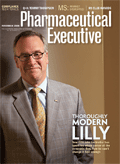Cash Flow Woes in EU
In Europe, it's different strokes for different folks at the top regulatory agencies
Europe is facing a crisis in healthcare. Like the US, the population is aging—leaving fewer working people to fund the care of the old. But the wildly different attitudes toward healthcare across the different member states make for a complex marketplace—and while drug approvals are ultimately the responsibility of the European Commission, the states' jealously guards the process of subsidiarity, which allows them to make their own healthcare decisions. And this focus on cost saving—above all—is impacting innovation.

Sarah Houlton
France currently holds the presidency of the European Union—a different country has that honour every six months—and President Nicolas Sarkozy is focusing his presidency on health. Delegates at a recent high-level conference in Paris were given insight into how some member states approach healthcare problems, and also what they can learn from each other.
The three biggest drug markets—the UK, Germany, and France—established agencies to decide how healthcare cash should be best spent. They all have different priorities and ways of going about it. In the UK, the National Institute for Health and Clinical Excellence (NICE) decides what should be used on a cost-effectiveness basis. Conversely, Germany's Institute for Quality and Efficiency in Health Care (IQWIG) sets a price ceiling. The newly established Haute Autorité de Santé (HAS) in France does both.
"Before we negotiate price, we look at efficacy, both medical benefits and clinical importance," said Laurent Degos, chairman of HAS. "This is done on an individual product basis immediately after licensing, and benefits are looked at post-licensing once it's on the market. We are trying to control healthcare expenditure today so we don't have to ration it tomorrow."
In many EU countries, particularly the former Eastern Bloc, there isn't the cash to pay for complex systems of health assessments. So they rely on the "big boys" to do it for them, with many decisions based on those of NICE.
"We are going for a free ride using the achievements of the UK, France, and others," said Lithuanian Health Minister Gediminas Cerniauskas. However, his country is introducing a radical new way of funding healthcare by creating medical savings accounts. "The idea is to increase non-taxed income, but that extra money will go to a savings account, and that will give almost universal healthcare coverage," he said. "It will also introduce copayments, which will save money. This will be a competitive product in financial markets, and will encourage insurance companies to increase their range of commercial health insurance products."
Similarly, the UK calculations are used in Hungary, as health minister Mélinda Medgyaszai explained. "There is no way in Hungary we could create these data," she said. "We have common problems, so why not create common solutions? With the pharma companies, the basis of good friendship is fairness—we have fixed prices and a solid generics market, but we have to buy innovative drugs for a fair price."
But there is a paradox—according to Philippe Kourilsky, professor of molecular immunology at the Collège de France. Despite having a higher population than the US, Europe's innovation contribution is three to four times lower.
He's not alone in his concern about innovation. "I keep telling my colleagues in the European Parliament that there will be no generics without innovation," said French MEP Françoise Grossetête. "If we cut prices, then we won't have new drugs. If we cut reimbursement then we deprive pharma companies of the money."
"Innovation seems to have stalled in Europe, despite the money spent on R&D," claimed Georgette Lalis, director of the EC's consumer goods directorate.
Kourilsky suggested that "evidence-based regulation" is the way ahead. "We need to develop this as a science—how to use cost–benefit analysis of the effects of drugs," he said.
With NICE's pioneering work, Europe already has a lead in this field. Moving forward, there is agreement that health technology assessments will play an essential role where the healthcare of the elderly is paid for by the declining working population. "All member states should benefit from HTAs," said Androulla Vassiliou, the EU's Commissioner for Health. "Encouraging low-cost generics allows money to be spent on innovative medicines."
Sarah Houlton is Pharmaceutical Executive's global correspondent. She can be reached at sarah@owlmedia.co.uk
